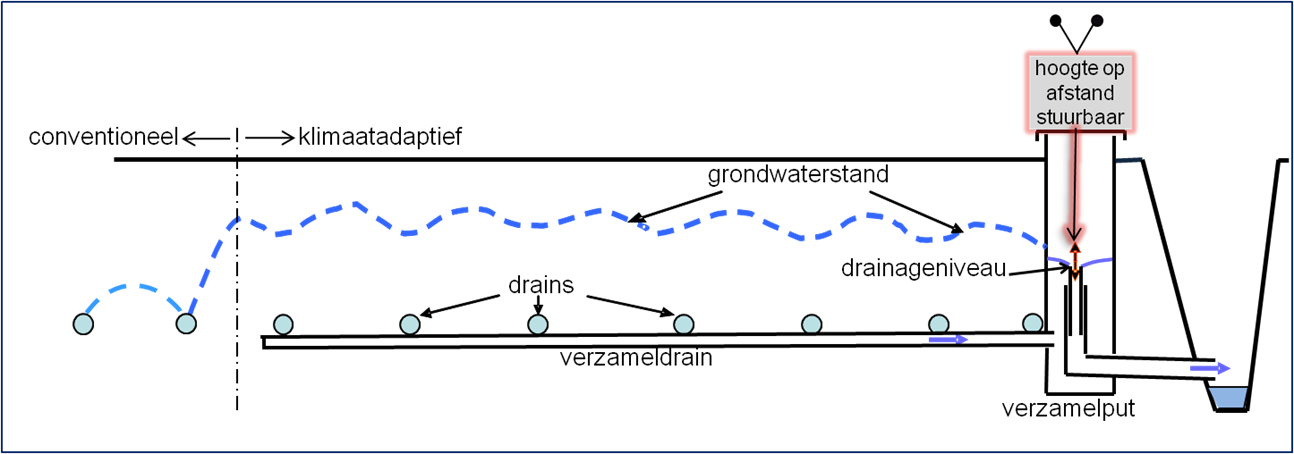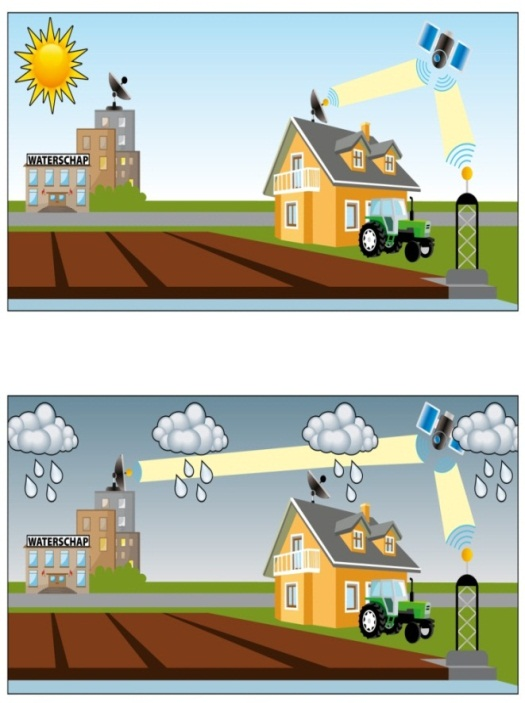The concept of Climate Adaptive Drainage is such that regional-scale water managers and local-scale farmers co-operate on the drainage system, in order to use the farm-scale soil system as an optimal water storage system. By using the local-scale soil as a water storage reservoir during rainfall events, current peak discharges can be decreased in a way that downstream problems on water management can be solved. When drought situations occur, pre-event rainfall can be stored instead of discharged using conventional drainage systems. During the study and development phase of the project, three prototypes of Climate Adaptive Drainage systems were installed at 3-5 ha farm sites across The Netherlands. The operation was monitored and evaluated, in order to obtain an optimized drainage and control system. Besides technical aspects, legal and management aspects were studied and a cost and benefit analysis was carried out.
In May 2011, FutureWater and partners won the project, initiated by AgentschapNL, part of the Ministry of Public Works & Environment, to study and develop a climate adaptive drainage system (SBIR contract 11308).

The concept of Climate Adaptive Drainage is such that regional-scale water managers and local-scale farmers co-operate on the drainage system, in order to use the farm-scale soil system as an optimal water storage system. Climate change in The Netherlands will lead to increased rainfall and more extreme rainfall events on one hand, and more pronounced and longer periods with dry weather conditions on the other hand. By using the local-scale soil as a water storage reservoir during rainfall events, current peak discharges can be decreased in a way that downstream problems on water management can be solved. When drought situations occur, pre-event rainfall can be stored instead of discharged using conventional drainage systems.

Technically, the Climate Adaptive Drainage system consists of a series of conventional subsurface drains at typical depth of 1.2m below soil surface and at a drain spacing of 6m, which are interconnected by a collector drain. This collector drain ends up in a drainage pit with an outlet. This drainage pit has equipment installed inside to remote and continuously manage the drainage basis, before drainage water is discharged to the surface water by the outlet. During the study and development phase of the project, three prototypes have been installed at 3-5 ha farm sites across The Netherlands. The operation is monitored and evaluated, in order to obtain an optimized drainage and control system. Besides technical aspects, legal and management aspects will be studied, as well as a cost and benefit analysis will be carried out. The project is carried out in strong cooperation with three farmers and water boards Hunze en Aa’s, Regge en Dinkel, and Brabantse Delta.
Climate Adaptive Drainage is flexible and can be applied under climate change conditions. The project will generate a power tool for both water managers and farmers, able to cope better with extreme weather conditions, as compared to using conventional drainage systems. As a result, a more sustainable and reliable adaptive water management will be supported by using our drainage system. The consortium run by FutureWater will meet the project objectives as well as possible. By the end of 2012, we will try and enable commercial use of the Climate Adaptive Drainage system.
More details and further background information on the project can be found at the project website: KAD website [in dutch]
Publicaciones relacionadas
2013 - FutureWater Report 123
KlimaatAdaptieve Drainage: een innovatieve methode om piekafvoeren en watertekorten te verminderen
Van den Eertwegh, G.A.P.H., P.J.T. van Bakel, L. Stuyt, A. van Iersel, L. Kuipers, M. Talsma, P. Droogers
2013 - FutureWater Report 120
KlimaatAdaptieve Drainage: analyse van kosten en baten voor waterbeheerder en agrariër. Eindrapportage Werkpakket 5: Economisch onderzoek
Van den Eertwegh, G.A.P.H., P. Droogers
2013 - FutureWater Report 119
KlimaatAdaptieve Drainage: juridisch-bestuurlijke aspecten. Eindrapportage Werkpakket 4: Juridisch-bestuurlijke aspecten
Van den Eertwegh, G.A.P.H.
2013 - FutureWater Report 118
KlimaatAdaptieve Drainage: landelijke geschiktheid van conventionele, samengestelde peilgestuurde drainage en KAD. Eindrapportage Werkpakket 3: Landelijke geschiktheid
Van Bakel, J., G.A.P.H. van den Eertwegh, H. Massop, J. Brandsma
2013 - FutureWater Report 117
KlimaatAdaptieve Drainage: een innovatieve methode om piekafvoeren en watertekorten te verminderen. Eindrapportage Werkpakket 2: Rekenmodules (SWAP)
Terink, W., J. van Bakel, G.A.P.H. van den Eertwegh, P. Droogers

